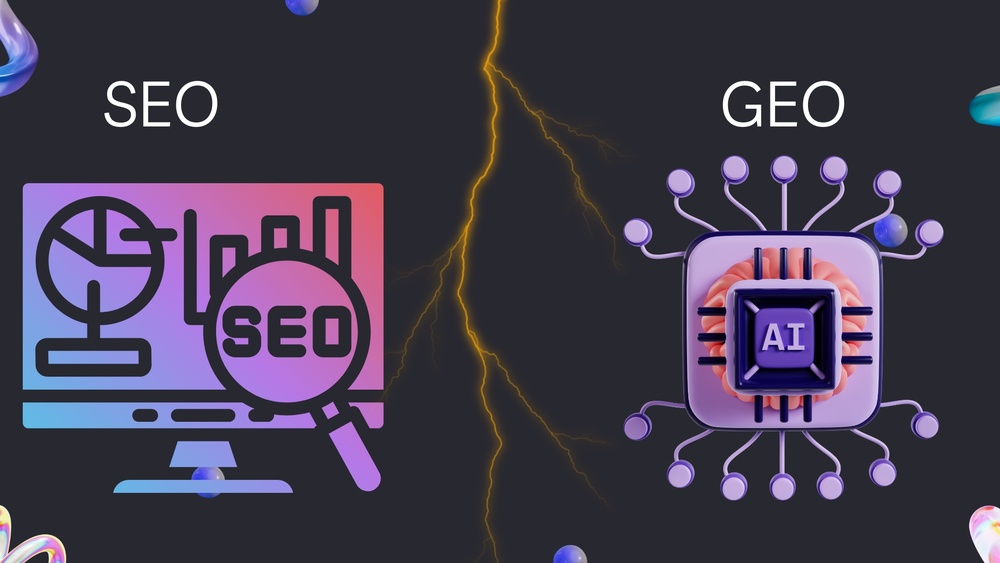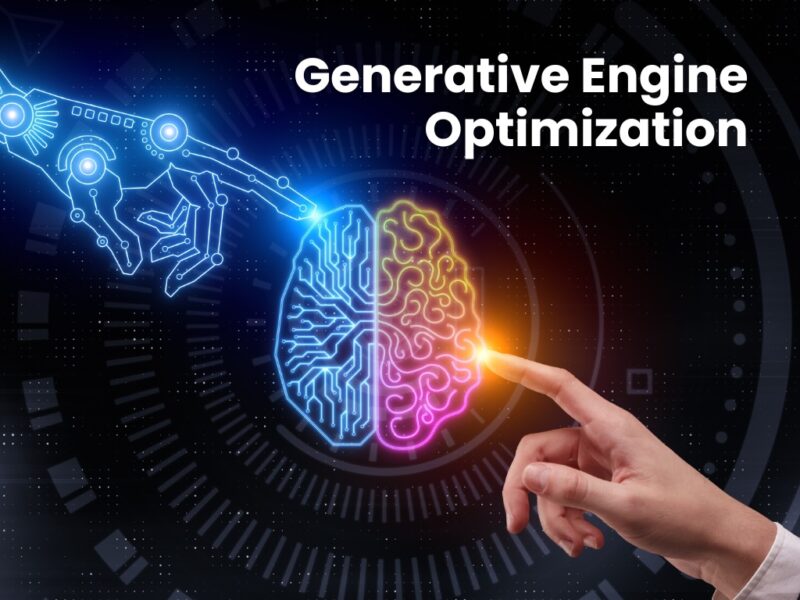Introduction: Generative Engine Optimization (GEO)
Change is the only constant in the fast-paced world of digital marketing. With the rise of artificial intelligence, the way people search for information is transforming rapidly. Just as Search Engine Optimization (SEO) became essential for ranking on Google and Bing, a new approach called Generative Engine Optimization (GEO) is emerging to help brands rank on AI-driven platforms like ChatGPT, Perplexity AI, Google AI Overviews, Copilot, and Gemini.
In this guide, we will explore:
- What GEO is
- How GEO differs from SEO
- Why GEO matters in 2025 and beyond
- Key benefits of GEO
- Strategies to optimize for AI-driven search
- The future potential of GEO
What Is Generative Engine Optimization (GEO)?
Generative Engine Optimization (GEO) is the process of optimizing content so that it appears prominently in AI-generated responses. Instead of optimizing only for traditional search engines that display a list of links, GEO focuses on AI answer engines that generate conversational, context-rich responses to user queries.
Example:
When someone asks ChatGPT, “What is the best CRM for small businesses?”, an AI engine might respond with a short, summarized answer. If your brand’s content is optimized for GEO, it can be referenced, cited, or even directly mentioned in that AI-generated response.
Key goals of GEO:
- Improve visibility in AI-generated answers
- Increase targeted traffic from AI platforms
- Build authority as a cited, trusted source
- Adapt to changing user search behavior
GEO vs. SEO: Understanding the Difference
While GEO and SEO share similarities, their core focus and optimization strategies differ.

Similarities between GEO and SEO
Both aim to:
- Increase content visibility online
- Use keywords strategically
- Provide high-quality, relevant content
- Follow E-E-A-T principles (Experience, Expertise, Authoritativeness, Trustworthiness)
- Improve user experience and engagement
- Adapt to evolving algorithms
- Use analytics for strategy refinement
Key Differences between GEO and SEO
| Feature | SEO (Search Engine Optimization) | GEO (Generative Engine Optimization) |
| Target Platform | Google, Bing, Yahoo (traditional search engines) | AI-driven answer engines (ChatGPT, Perplexity, Gemini) |
| Output Type | List of ranked web pages | Synthesized, conversational answers |
| Optimization Focus | Keywords, backlinks, meta tags, page speed | Contextual clarity, structured data, semantic relevance |
| User Query Match | Matches keywords to queries | Understands and predicts user intent |
| Content Integration | Optimized for SERPranking | Optimized for AI synthesis & citation |
| Measurement Metrics | Organic traffic, SERP rankings | Citations in AI answers, referral traffic from AI engines |
| Adaptation Needs | Algorithm updates from search engines | Evolving AI models & response structures |
Why GEO Is Important
AI-driven search adoption is accelerating.
Industry stats to note:
- Gartner predicts a 25% drop in traditional search volume by 2026.
- Over 79% of consumers will use AI-enhanced search in the next year.
- Platforms like ChatGPT already have 180+ million monthly active users.
With more people starting their searches on AI platforms, traditional SEO alone is no longer enough. Brands that fail to adapt risk losing visibility, traffic, and relevance.
Benefits of GEO
- Expanded Reach – Appear in AI-driven searches beyond Google’s SERPs.
- Improved User Experience – Provide direct, relevant, and contextual answers.
- Early-Mover Advantage – Gain authority before competitors catch up.
- Stronger Brand Credibility – Get cited as a trusted source in AI answers.
- Future-Proof Strategy – Stay competitive in the evolving AI search landscape.
- Data-Driven Insights – Learn how AI platforms perceive and reference your brand.
How Generative AI/Answer Engines Work
To optimize for GEO, it’s important to understand how AI answer engines generate responses:
- Data Collection – AI scans massive datasets, including websites, research papers, and online communities.
- Processing – Cleans and organizes information.
- Training – Uses machine learning models to understand language, context, and patterns.
- Response Generation – Synthesizes relevant information into a conversational answer.
- Prioritization – Chooses the most relevant, credible, and clear content to cite or reference.
How GEO Works: The Core Strategy
To succeed in GEO, you must align your content with how AI engines process, select, and present information.
1. Research & Analysis
- Identify AI-preferred keywords (long-tail, conversational).
- Study AI-generated responses for your target topics.
- Analyze which sources AI cites most often.
2. Content Quality & Relevance
- Provide clear, direct, and comprehensive answers.
- Use statistics, examples, and expert quotes.
- Keep content factually accurate and well-cited.
3. Content Structure
Use short paragraphs and bullet points.
Include structured data (schema markup).
Place direct answers at the start of the content.
4. Content Distribution
- Publish on your site, but also share on platforms AI crawls like Reddit, Quora, and Medium.
- Encourage user-generated content (reviews, testimonials).
5. Brand Authority
- Build backlinks from reputable sources.
- Keep messaging consistent across all platforms.
6. Technical SEO Alignment
- Ensure mobile-friendliness and fast loading speed.
- Fix broken links and indexing issues.
Integrating GEO with SEO
GEO is not a replacement for SEO—it’s a layer on top of it.
Best practices for combining both:
- Create evergreen SEO content and enhance it with GEO-friendly structuring.
- Use both traditional keywords and conversational phrases.
- Keep monitoring both SERP rankings and AI citation frequency.
Future of GEO
GEO will evolve alongside AI advancements:
- Voice Search Integration – Optimizing for spoken queries.
- Visual Search – AI interpreting and generating answers from images.
- Hyper-Personalization – AI tailoring results to each user’s profile.
- Multimodal Search – Combining text, image, audio, and video in one result.
Brands that adapt now will be better positioned to dominate future AI-driven search environments.
Conclusion
Generative Engine Optimization (GEO) represents the next major evolution in digital marketing. While SEO focuses on ranking in traditional search engines, GEO ensures your content is found, cited, and trusted by AI-driven platforms.
By combining GEO strategies with strong SEO foundations, businesses can:
- Stay visible across both traditional and AI search
- Gain a competitive advantage
- Build trust and authority in the AI-powered web
The brands that embrace GEO today will lead the digital conversation tomorrow.
Follow Us: Facebook, Twitter, LinkedIn, Instagram & YouTube.
Contact us today for any SEO related Query!

Sandeep Kumar is the founder of Oshin Web Solution and a seasoned digital marketing expert with over 12 years of experience. He specializes in SEO, paid marketing, and online brand growth, helping businesses achieve measurable results in the digital space. When not strategizing campaigns, Sandeep enjoys exploring the latest marketing trends and sharing his insights with the community.






